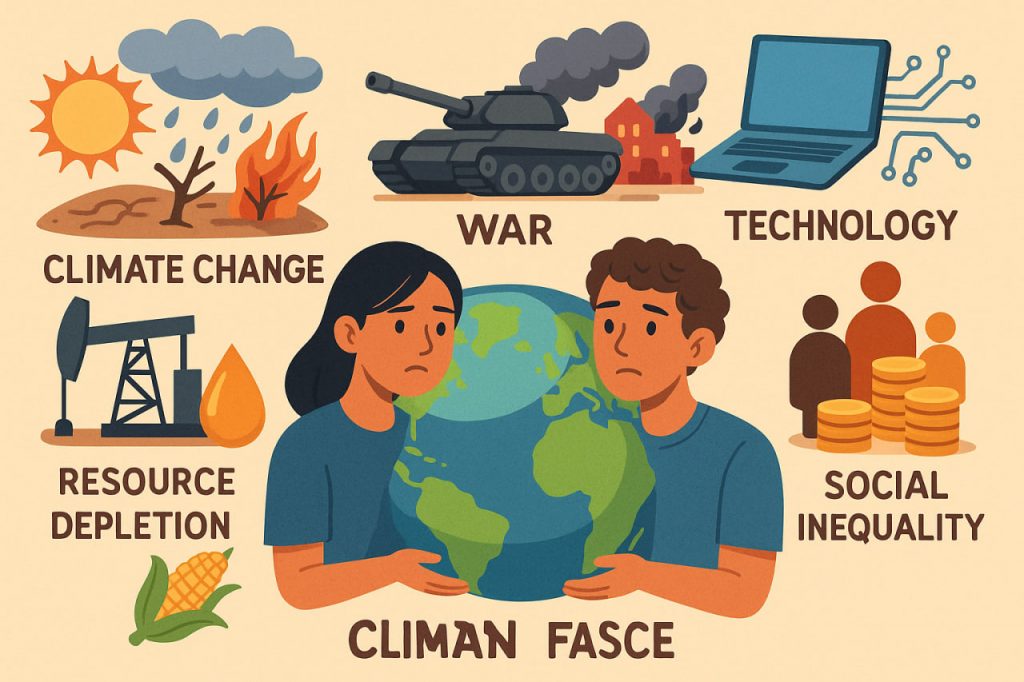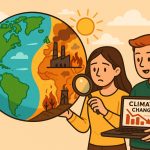Modern civilization has achieved unprecedented progress in science, technology, medicine, and communication. Yet, alongside these achievements, humanity faces complex challenges that threaten the stability of societies and the planet as a whole. These challenges require not only scientific and political solutions but also global cooperation and personal responsibility.
Climate Change and Environmental Degradation
One of the most pressing issues is the climate crisis. Rising global temperatures, extreme weather events, desertification, and melting ice caps threaten ecosystems and human survival. Deforestation, ocean pollution, and biodiversity loss further weaken Earth’s resilience. Without urgent action, the environmental crisis could cause irreversible damage.
Resource Scarcity
As the global population grows, demand for water, food, and energy continues to rise. Many regions already face water shortages, while overfishing and soil depletion threaten future food security. The dependence on fossil fuels creates both environmental and geopolitical risks, highlighting the need for sustainable resource management.
Technological Risks
Technology brings progress but also new dangers. Cybersecurity threats, artificial intelligence misuse, and digital surveillance raise ethical and security concerns. Additionally, the spread of misinformation through social media undermines trust in institutions and fuels conflicts. Balancing innovation with responsibility is a critical task.
Global Inequality
Despite global wealth, billions of people still live in poverty. Access to healthcare, education, and basic resources remains unequal. This inequality fuels migration crises, social unrest, and political instability, making fair distribution of opportunities a major challenge for the 21st century.
Health Challenges
The COVID-19 pandemic demonstrated how vulnerable modern society is to global health crises. Beyond pandemics, rising rates of chronic diseases linked to lifestyle, antibiotic resistance, and aging populations present serious medical and economic challenges. Strong healthcare systems and international cooperation are essential.
Geopolitical Conflicts
Wars, terrorism, and political instability continue to threaten peace. Competition over natural resources, territorial disputes, and ideological differences cause ongoing conflicts, displacing millions of people and creating humanitarian crises.
Cultural and Ethical Shifts
Modern civilization also faces challenges of values: maintaining human rights, adapting to cultural diversity, and defining ethical boundaries in biotechnology, genetics, and artificial intelligence. These issues shape how humanity balances freedom, progress, and responsibility.
Conclusion
Modern civilization is at a crossroads. The main challenges include climate change, resource scarcity, technological risks, inequality, health crises, geopolitical instability, and ethical dilemmas. Solving them requires global cooperation, sustainable development, and responsible innovation. By addressing these issues today, humanity can ensure a safer and more just future for generations to come.
To confront the global challenges of civilization, we must unite, and if we do not do so in the shortest possible time, we will simply perish. Today, every individual can make a significant impact, and it all begins with asking oneself, “What can I do today to benefit others and society?”
Glossary
- Climate crisis – severe global changes caused by rising greenhouse gases and warming.
- Resource scarcity – lack of essential natural resources such as food, water, or energy.
- Cybersecurity – protection against attacks and threats in digital systems.
- Inequality – unfair distribution of wealth and opportunities in society.
- Sustainable development – progress that meets current needs without harming future generations.


